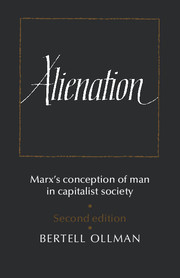Book contents
- Frontmatter
- Contents
- Preface to the second edition
- Note on translations
- Acknowledgements
- General introduction
- PART I PHILOSOPHICAL INTRODUCTION
- 1 With words that appear like bats
- 2 Social relations as subject matter
- 3 The philosophy of internal relations
- 4 Is there a Marxian ethic?
- 5 Dialectic as outlook
- 6 Dialectic as inquiry and exposition
- PART II MARX'S CONCEPTION OF HUMAN NATURE
- PART III THE THEORY OF ALIENATION
- PART IV CONCLUSION
- Appendix I In defense of the philosophy of internal relations
- Appendix II Response to my critics: more on internal relations
- Notes to the text
- Bibliography of works cited
- Index of names and ideas
- Cambridge Studies in the History and Theory of Politics
1 - With words that appear like bats
Published online by Cambridge University Press: 05 June 2012
- Frontmatter
- Contents
- Preface to the second edition
- Note on translations
- Acknowledgements
- General introduction
- PART I PHILOSOPHICAL INTRODUCTION
- 1 With words that appear like bats
- 2 Social relations as subject matter
- 3 The philosophy of internal relations
- 4 Is there a Marxian ethic?
- 5 Dialectic as outlook
- 6 Dialectic as inquiry and exposition
- PART II MARX'S CONCEPTION OF HUMAN NATURE
- PART III THE THEORY OF ALIENATION
- PART IV CONCLUSION
- Appendix I In defense of the philosophy of internal relations
- Appendix II Response to my critics: more on internal relations
- Notes to the text
- Bibliography of works cited
- Index of names and ideas
- Cambridge Studies in the History and Theory of Politics
Summary
The most formidable hurdle facing all readers of Marx is his ‘peculiar’ use of words. Vilfredo Pareto provides us with the classic statement of this problem when he asserts that Marx's words are like bats: one can see in them both birds and mice. No more profound observation has ever been offered on our subject. Thinkers through the years have noticed how hard it is to pin Marx down to particular meanings, and have generally treated their non-comprehension as a criticism. Yet, without a firm knowledge of what Marx is trying to convey with his terms, one cannot properly grasp any of his theories.
How, for example, are we to understand the startling claim that ‘Value is labor’ (my emphasis), or Marx's assertion that the ‘identity of consumption and production … appears to be a threefold one’, or his allusion to theory which under certain circumstances becomes a ‘material force’? Marx's statements frequently jar us, and instances of obscurity in his work, occasions where two or more interpretations seem equally applicable, are more numerous still.
Engels was well aware of the trouble people had in coming to grips with Marx's terminology. In his Preface to the English edition of Capital I, he says, ‘there is, however, one difficulty we could not spare the reader: the use of certain terms in a sense different from what they have, not only in common life, but in ordinary political economy.’
- Type
- Chapter
- Information
- AlienationMarx's Conception of Man in a Capitalist Society, pp. 3 - 11Publisher: Cambridge University PressPrint publication year: 1977

